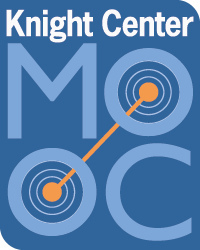

More than 2,300 people from over 120 countries will start this Monday, Aug. 12 a five-week online course to learn the basic skills of data-driven journalism thanks to the Knight Center for Journalism in the Americas‘ innovative Massive Open Online Courses (or MOOCs) program, which has already reached more than 15,000 people from five continents since the initiative was launched 10 months ago.
MOOCs are revolutionizing the world of online education and, since October 2012, the Knight Center has offered its own with a twist. While most massive online courses are college classes that have been recorded on video and adapted to be shared over the Internet, the Knight Center’s MOOCs have been specifically designed for the new format, emphasizing student interactions and collaborations. Through the courses’ online forums, instructors are constantly answering questions and making general comments about students’ work, while students are encouraged to discuss their assignments and help each other.
The Knight Center’s latest MOOC, “Data-Driven Journalism: The Basics,” seeks to explore new territory again: it will be the first time the Knight Center offers a course with multiple instructors, offering students the chance to interact and learn directly from data journalism experts working at leading U.S. publications like the New York Times, NPR, The Houston Chronicle and Pro Publica.

The program has already been a success, not only because of the impressive number of students it has attracted, but also because of its quality and effectiveness despite its low budget structure. Reviews and comparisons with other MOOC programs have been overwhelmingly favorable.
In little less than a year, the initiative has successfully pushed the boundaries of the format and proven that dynamic interactions are not only possible in online classes with thousands of participants, but also enrich the students’ experience significantly.
What’s more, in an age where everyone is a potential citizen reporter, the Knight Center’s massive online courses represent a significant first effort to provide necessary transparency to journalistic tools and processes through training open for media workers and the general public alike.
“We are very pleased to democratize access to journalism training. In era when journalism is no longer a monopoly of journalists and any citizen can commit acts of journalism, it is important to spread basic journalism skills as much as possible,” said Professor Rosental Calmon Alves, founder and director of the Knight Center. “This program that we have been calling ‘Journalism for All’ aims not only to give a chance to journalists and non-journalists alike to access training, but also to help people appreciate the value and importance of professional journalism.”

The first two MOOCs offered by the Knight Center were taught by Alberto Cairo, an internationally recognized expert in infographics and data-visualization who started his career in his native Spain and now teaches at the University of Miami. His MOOC, “Introduction to Infographics and Data Visualization,” was first taught last year to 2,000 participants. It was so well received that the Knight Center had to offer a second edition a month later, which attracted 5,250 students from 133 countries.
Cairo’s course was followed by the MOOC “How to Improve Electoral Coverage,” which was taught in Spanish by acclaimed Colombian journalist María Teresa Ronderos and concluded on

April 2013. The course had 1,772 participants from 45 countries.
The Knight Center’s most recent MOOC was “Introduction to Data Journalism,” with instructor Sandra Crucianelli. The course in Spanish concluded last month after attracting nearly 4,000 people from 62 different countries.
All four courses have been praised for their dynamic and interactive nature.
“When I took the dataviz MOOC with Alberto Cairo, I don’t know how much time he and his assistant spent patrolling the message boards and reviewing projects, but they seemed very hands-on,“ said former participant SocProf on his website The Global Sociology Blog, in which he compared the Knight Center’s MOOC to other courses in Coursera and Udacity.

Students have also enjoyed collaborating with each other. After finishing Ronderos’ MOOC on electoral coverage, participant Diana Gil Calvo, a press specialist at Peru’s Ministry of Education, said the course “was an enriching experience, not only because of the high level of the instruction but also because of the first-time opportunity to share different experiences with colleagues from other countries.”
Even though the program’s effectiveness has been tested, the challenge will now be to ensure the program’s sustainability as the Knight Center seeks new sources of financing, Alves said.
“For now, a small amount of revenue is obtained through a $30 fee that participants are invited to pay if they request a certificate of completion after passing all of their course’s requirements. But we will need to find more sources of revenue or grants to continue this fascinating program,” Alves said.
The Knight Center for Journalism in the Americas was created in 2002 by Professor Rosental Alves at the University of Texas at Austin School of Journalism thanks to a generous donation from the John S. and James L. Knight Foundation, which has been supporting it continually. The Center also receives major contributions from the Open Society Foundations and The University of Texas at Austin. The Center’s main goal is to help journalists in Latin American and the Caribbean to improve the quality of journalism in their countries.

Knight Center for Journalism in the Americas
300 West Dean Keeton
Room 3.212
Austin, TX, 78712
Phone: 512-471-1391
Email: journalismcourses@austin.utexas.edu